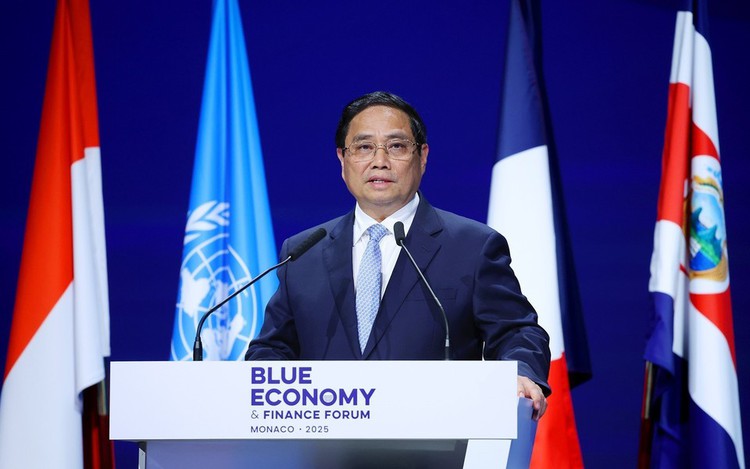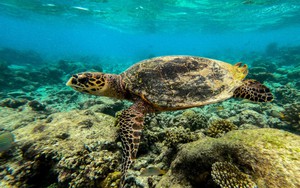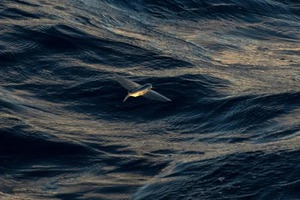
Vietnamese Prime Minister Pham Minh Chinh delivers remarks at the Blue Economy and Finance Forum in Monaco, June 8, 2025. Photo: Vietnam News Agency
The event, held alongside Chinh’s visit to France and his participation in the third United Nations Ocean Conference (UNOC 3), gave Vietnam a platform to present its maritime development strategy and highlight efforts to align with global environmental and financing standards.
Vietnam’s attendance aimed to promote its 2030 marine sustainability goals, which include offshore wind power, sustainable fisheries, and international cooperation on marine governance.
The Southeast Asian country’s 2018 strategy targets ocean-based economic growth while protecting ecosystems, with a long-term vision through 2045.
The BEFF brought together policymakers and investors to discuss solutions for resilient oceans, green port infrastructure, and sustainable shipping.
The term ‘blue economy’ refers to ocean-related economic activity that supports sustainability and resilience.
Organizers of the BEFF said the event was not only an academic forum, but also a mechanism to match financial flows with concrete projects worldwide.
In recent years, Southeast Asia has become a testing ground for innovative ocean finance instruments.
In February, a fisheries impact bond known as the Small-Scale Fisheries (SFF) Impact Bond was launched in Jakarta, Indonesia to fund sustainable fishing while delivering conservation results.
Under the model, investors receive returns based on environmental outcomes.
While global NGOs and multilateral groups continue to support marine protected areas, initiatives like SFF are shifting focus toward scaling sustainable livelihoods.
The World Bank has also proposed a coral reef bond for Indonesia as part of the region's broader green finance efforts.
Southeast Asia’s vulnerability to climate change and dependence on ocean resources have pushed governments to act.
Despite a global pledge to protect 30 percent of marine areas by 2030, only around three percent of Southeast Asia’s national waters are currently under protection.
Overfishing remains a concern.
According to the World Economic Forum, fish stocks in the East Vietnam Sea have dropped by up to 75 percent, while nearly 60 percent of local shark and ray species face extinction risk.
Vietnam, which relies heavily on the ocean for trade, fisheries, tourism, and energy, is looking to expand access to sustainable finance.
According to the OECD, the global ocean economy could exceed US$3 trillion by 2030, requiring at least $175 billion in annual investment to meet sustainability goals.
Prime Minister Chinh’s attendance at the BEFF highlighted Vietnam’s efforts to attract private capital into marine conservation, infrastructure, and renewable energy.
The Vietnamese government believes international partnerships and financial innovation will play a key role in delivering both environmental and economic outcomes.




Max: 1500 characters
There are no comments yet. Be the first to comment.